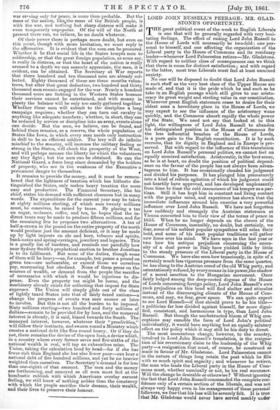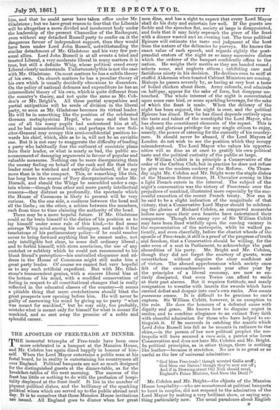LORD JOHN RUSSELL'S PEERAGE: MR. GLAD- STONE'S OPPORTUNITY.
great political event of the week to English Liberals is one that will be generally regarded with very hesi- tating feelings. The effect of raising Lord John Russell to the House of Lords will necessarily be two-fold : one per- sonal to himself, and one affecting the organization of the Liberal party in the House of Commons and its residuary leader—whenever Lord Palmerston retires—Mr. Gladstone. With regard to neither class of consequences can we think that there is room for distinct satisfaction; and with regard to the latter, most true Liberals must feel at least unmixed anxiety. No one will be disposed to doubt that Lord John Russell is such stuff as the very best class of the Upper House are made of, and that it is the pride which he and such as he take in an English peerage which still gives to our aristo- cracy its great weight and sterling value in our constitution. Whenever great English statesmen cease to desire for their eldest sons a hereditary place in the House of Lords, we may expect to see the influence of the aristocracy wane quickly, and the Commons absorb rapidly the whole power of the State. We need not say that looked at iu this light, the willingness of Lord John Russell to abandon his distinguished position in the House of Commons for the less influential benches of the House of Lords, is a pure gain to the English constitution. It is by such recruits, that its dignity in England and in Europe is pre- served. But with regard to the influence of this translation on Lord John Russell's personal politics, we cannot feel an equally unmixed satisfaction. Aristocratic, in the best sense, as he is at heart, no doubt the position of political depend- ance on the favour of the people has not always been advan- tageous to him. It has occasionally clouded his judgment and divided his purposes. It has plunged him prematurely into a kind of reform agitation of which his judgment could not heartily have approved, and has developed unpleasantly from time to time the cold insouciance of his temper as a par- tizan. Still it has kept him in constant and living contact with the popular mind, and experience has shown that the immediate influences around him exercise a very powerful influence over Lord John Russell. We have not forgotten how suddenly and strangely the Austrian statesmen at Vienna converted him to their view of the terms of peace in 1855. When he no longer depends on the cheers of the House of Commons, insensibly, no doubt, but certainly, we fear, some of his noblest popular sympathies will relax their hold, and some of his least popular traditions will gather new force over his mind. We have se‘en in the last year or two how his antique prejudices concerning the neces- sity of a dual power in Italy have yielded little by little to the steady pressure of the Liberal party in the House of Commons. We have also seen how tenaciously, in spite of a certainly much less vigorous pressure from the same quarter, he has clung to the Austrian creed of the old Whig party, and ostentatiously refused,by every means in his power,the shadow of a moral sanction to the Hungarian movement. Once fairly lodged among the deep-rooted dogmas of the House of Lords concerning foreign policy, Lord John Russell's own rank prejudices on this head will find shelter and stimulus instead of the discouraging climate of the House of Com- mons, and may, we fear, grow apace. We can quite expect to see Lord Russell—ii that should prove to be his title— a politician far less divided against himself, far more digni- fied, consistent, and harmonious in type, than Lord John Russell. But though the unobstructed bloom of Whig con- ceptions may ennoble the form of Lord John's political individuality, it would have anything but an equally salutary effect on the policy which it may still be his duty to direct. The most momentous change, however, to the country, involved in Lord John Russell's translation, is the resigna- tion of his reversionary claim to the leadership of the Whig party—a resignation that must, of course, be construed as made in favour of Mr. Gladstone. Lord Palmerston cannot in the nature of things long retain the post which he fills with so much spirit and sagacity ; and whenever he retires, the man who leads the Liberal party in the House of Com- mons must, whether nominally or not, be his real successor. Will the change be desirable or otherwise Without ignoring the fact that Lord John Russell commanded the complete con- fidence only of a certain section of the liberals and was not always very happy even in his management of these personal followers, we fear that his loss will be severely felt. It is true that Mr. Gladstone would never have served meekly under him, and that he could never have taken office under Mr. Gladstone ; but we have great reason to fear that the Liberals will be altogether a more divided and incoherent body under the leadership of the present Chancellor of the Exchequer, even without any detached Russell party to confer on it the dangerous favour of independent support, than they would have been under Lord john Russell, notwithstanding the similar detachment of Mr. Gladstone and his very few per- sonal allies. Lord John Russell is at all events a tried and trusted Liberal, a very moderate liberal in many matters it is true, but still a definite Whig, hose political creed every Liberal clearly understands. -Unfortunately this is not the case with Mr. Gladstone. On most matters he has a subtle theory of his own. On church matters he has a peculiar theory of his own which is usually decidedly obnoxious to dissenters. On the policy of national defences and expenditure he has an intermediate theory of his own, which is quite different from the country's theory-, and not quite the same as Mr. Cob- den's or Mr. Bright's. All these partial sympathies and partial antipathies will be seeds of division in the liberal party, so soon as Mr. Gladstone becomes its virtual leader. He will be in something like the position of the celebrated German metaphysician Hegel, who once said that but one of all his many pupils had understood him at all, and he had misunderstood him; and perhaps the new Soli- eitor-General may occupy this semi-confidential position to- wards his chief, which, able as he is, will not be an enviable one. But it is not easy to exaggerate the difficulty of leading a party 'who habitually. fear the outburst of eccentric plans from their leader, or what is nearly as bad, the public an- nouncement of damaging arguments in favour of popular and valuable measures. Nothing can be more disorganizing than the uneasy feeling on behalf of the rank and file that their leader must be watched and carefully disclaimed, if he say more than is in the compact. This, or something like this, has long been the source of Tory disorganization under Mr. Disraeli, and should the Whigs be assembled under a cap- tain whom—though from other and more purely intellectual reasons—they distrust as profoundly, the spectacle which the House of Commons is likely to present will be very curious. On the one side, a coolness between the head and all the limbs ; on the other, a schism between the members, each from time to time claiming the authority of the bead.
There may be a more hopeful future. If Mr. Gladstone could so far train himself to the duties of his position as to lay himself under some rule of this kind,—to find some average Whig mind among his colleagues, and make it the touchstone of his parliamentary policy—if he could resolve never to bring forward anything that he cannot make not only intelligible but clear' to some dull ordinary ; and to forbid himself, with stern asceticism, the use of any crotchet or subtlety which he could not recommend to his blunt friend's perception—his unrivalled eloquence and ad- dress in the House of Commons might still make him a great party leader. Of course we cannot feel very hopeful as to any such artificial expedient. But with Mr. Glad- stone's transcendent genius, with a sincere liberal bias at the bottom of his mind, with a modified conservatism of feeling in respect to all constitutional changes that is really reflected in the educated classes of the country—it seems a pitiable thing that mere crotchetiness should blast the great prospects now opening before him, He will never be guilty of narrowing his mind by giving up to party "what was meant for mankind," but he may only, too probably, mistake what is meant only for himself for what is meant for mankind, and so cast away the promise of a noble and splendid career.































 Previous page
Previous page